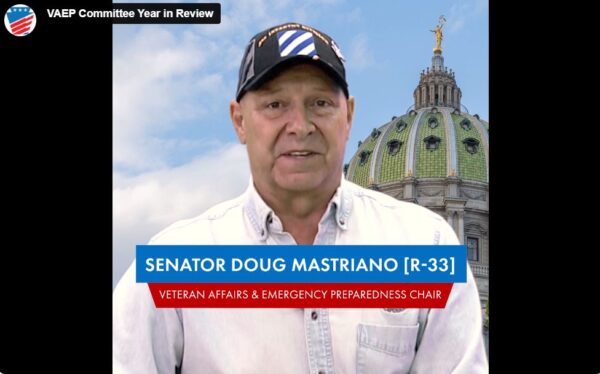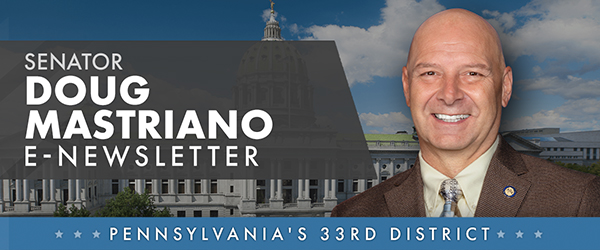|
View this email in a browser
In this Update:
- Veteran Affairs and Emergency Preparedness Committee 2023 Year in Review
- Mastriano, Chair of Senate Veterans Affairs and Emergency Preparedness Committee, Calls for PA National Guard Deployment to Texas Border with Mexico
- Op-ed: Democrats’ Education Funding Recommendations Would Lead to Tax Hikes on Pennsylvanians
- Protecting PA’s Local Governments from Cyberattacks
- 2023 Accomplishments: Supporting PA Seniors
- Improving Pennsylvanians’ Experiences by Increasing Broadband Access
- PA VETConnect Helps Veterans Access Programs and Services
- Grants Available to Support Student Safety, Behavioral Health Needs
- Preventing Cancer by Increasing Access to Screenings
Veteran Affairs and Emergency Preparedness Committee 2023 Year in Review

Mastriano, Chair of Senate Veterans Affairs and Emergency Preparedness Committee, Calls for PA National Guard Deployment to Texas Border with Mexico

Sen. Doug Mastriano (R-33) – chair of the Senate Veterans Affairs and Emergency Preparedness Committee – today called for Gov. Josh Shapiro to deploy Pennsylvania National Guard troops to Texas to support Operation Lone Star.
Texas Gov. Greg Abbott initiated Operation Lone Star in March 2021 in response to the unprecedented rise in illegal immigration. Operation Lone Star personnel work to detect and repel illegal crossings, arrest human smugglers and cartel gang members, and stop the flow of deadly drugs like fentanyl.
“Reckless federal government policies have created a crisis at our nation’s southern border,” Mastriano said. “Every state is now a border state. Pennsylvania has a compelling interest to help secure the southern border of the United States. Fentanyl has flooded communities throughout our commonwealth, school districts are increasingly burdened, and strained social safety net funds are being diverted.”
According to a 2023 report, at least 251,000 illegal immigrants reside in Pennsylvania with an annual burden of more than $1.6 billion on taxpayers.
“Illegal immigration costs Pennsylvania taxpayers more than this year’s state budget allocated for the departments of Agriculture, Community and Economic Development, Conservation and Natural Resources, Drug and Alcohol Programs, Environmental Services, Health, Military and Veterans Affairs, Transportation, Labor and Industry, and State, and the Pennsylvania Emergency Management Agency combined,” Mastriano said. “The cost of illegal immigration is more than double the size of the increase in spending for the Department of Education in this year’s state budget.”
In May 2023, Abbott sent letters to governors requesting support for Operation Lone Star. So far, 14 states – Arkansas, Florida, Iowa, Idaho, Nebraska, North Dakota, Ohio, Oklahoma, South Carolina, South Dakota, Tennessee, Virginia, West Virginia and Wyoming – have responded and deployed personnel and resources to secure the border.
“Securing our border is a bipartisan priority,” Mastriano said. “I am calling on the governor to deploy National Guard troops and resources to assist with Operation Lone Star. The inaction of the federal government to secure Pennsylvanians from the influx of deadly drugs into our communities has made this necessary.
“More than 276 years ago, Benjamin Franklin founded what is now our National Guard to provide a common defense of Pennsylvania in times of crisis. The lawlessness on the U.S. southern border, and its impacts upon the people of Pennsylvania, constitutes a crisis that calls for this response.”
The Senate Veterans Affairs and Emergency Preparedness Committee oversees the planning and activities of the Pennsylvania National Guard.
Democrats’ Education Funding Recommendations Would Lead to Tax Hikes on Pennsylvanians

Throwing more money at a problem before addressing the cause of that problem is never a wise investment.
It’s no secret that Pennsylvania’s education system is failing many of our students.
According to 2023 U.S. News education rankings, Pennsylvania ranks 36th in overall quality of education. Meanwhile, we have the 8th most expensive system in the nation and our average cost per student is $22,000. Lack of funding is not the problem, but how that money is spent must be scrutinized to ensure that our kids get the quality education they deserve.
Take the School District of Philadelphia for an example. Recent data from the National Assessment of Educational Progress shows that Philadelphia ranks near the bottom nationally for both math and reading when compared to similar urban districts.
From 2019-2022, the district saw it steepest decline in math and reading scores since 1990 despite spending an annual budget of more than $4 billion.
Families failed by their local education system have increasingly turned to alternatives such as homeschool and charter schools.
What’s the remedy?
According to Democrats on the Basic Education Funding Commission, the solution is a reckless infusion of additional taxpayer dollars to a failing system.
The commission’s partisan majority report, backed by Democrats and members of Gov. Josh Shapiro’s administration, calls for more than $7 billion in additional spending.
What’s not included in their recommendations? There are no accountability measures or metrics for student success. They include no additional scholarship funding for families who seek alternative options to help their kids escape failing schools. There are zero improvements to curriculum transparency so parents can know what their children are learning.
The General Assembly has already increased state taxpayer spending for education by historic amounts in recent years. Since 2020, taxpayer spending on education has increased by more than $3 billion. Sadly, that has not been accompanied by an improvement in quality.
How much of that new taxpayer money will go to help students and teachers? Unfortunately, not as much as you think.
While Pennsylvania’s public-school population has declined, the growth of school administration staff has accelerated by almost 40% since 2000. Most new funds will ultimately be diverted to pay for bloated salaries and pension payments for those unnecessary additional administrators.
The financial burden of a $7 billion infusion of taxpayer funds will be placed squarely on the backs of hard-working Pennsylvanians.
The nonpartisan Independent Fiscal Office already predicts that by 2025, Pennsylvania will face a $3 billion state budget shortfall based on current budget projections.
The massive spending binge recommended by Pennsylvania Democrats means our state would need more revenue to offset the increase.
Pennsylvania already has one of the worst property tax burdens in the nation to pay for education budgets.
More than 10,000 homes are seized annually in Pennsylvania and auctioned off for failure to pay the tax. It is particularly troubling that most of the home seizures are from our elderly residents. Retirees live on limited-fixed incomes and additional irresponsible state spending could leave them faced with the stark choice of paying for food, medicine or their property tax. This is simply unacceptable.
Property taxes would increase in all 67 counties to pay for the kind of spending increase recommended by Pennsylvania Democrats.
An increase in the state sales tax and income tax also would likely be on the table in future sessions of the General Assembly to offset budget shortfalls.
As we head into the 2024 budget season, we must protect Pennsylvanians and make fundamental changes to improve how we spend taxpayer funds for education. The money should follow the child and parents should have the right to choose how and where to educate their own children.
Blind spending of additional taxpayer dollars will not fix the fundamental problems of our education system.
Protecting PA’s Local Governments from Cyberattacks

The Senate Communications and Technology Committee and the Senate Local Government Committee this week examined cybersecurity threats faced by local governments and municipal authorities.
Recent cyberattacks targeting the Bucks County emergency dispatch system and the Aliquippa Water Authority highlight the vulnerability of Pennsylvania’s more than 2,500 local governments and authorities.
While exposure of residents’ personal information is a serious concern, these attacks can also interfere with ways people satisfy basic needs, such as the delivery of clean drinking water to their homes and being able to call for help in the case of an emergency. Learn more from the cybersecurity experts and local government officials who took part in the hearing.
2023 Accomplishments: Supporting PA Seniors

As part of Senate Republicans’ commitment to healthy and safe communities, we are focused on supporting Pennsylvania seniors. This means making sure they have access to the health care they need and preventing their exploitation.
One new law adjusts Medicaid reimbursement rates for nursing homes so the facilities can continue to meet the needs of vulnerable patients. Another law ensures seniors do not lose access to Pennsylvania’s prescription drug programs due to an increase in their Social Security payments.
A third piece of legislation recently signed into law aims to prevent elder abuse by strengthening guardianship laws. It protects vulnerable adults within the guardianship system from fraud, abuse, neglect and exploitation.
Improving Pennsylvanians’ Experiences by Increasing Broadband Access

Federal grants are available to improve the experiences Pennsylvanians have at medical care facilities, schools and libraries. The Pennsylvania Broadband Development Authority’s Capital Projects Fund allows for investment in high-quality broadband infrastructure as well as other connectivity infrastructure, devices and equipment.
The $45 million of competitive grants can be used for community projects to construct, acquire or improve facilities that will enable work, education and health monitoring.
Grants will be awarded in amounts ranging from $250,000 to $2 million. Apply online through April 20. While the grant funding was awarded through a federal program, it supports Senate Republicans’ priority of infrastructure advancement.
PA VETConnect Helps Veterans Access Programs and Services

Because of legislation supported by Senate Republicans, PA VETConnect makes it easier for Pennsylvania’s 700,000 veterans to access the programs and services available to help them.
Administered by the Pennsylvania Department of Military and Veterans Affairs, PA VETConnect benefits service members, veterans and their families. The database of resources enables local veteran advocates to point veterans to information, resources, programs and services in their area and across the commonwealth.
Resource areas include benefits, employment, financial assistance, post-traumatic stress, mental wellness and substance use.
Grants Available to Support Student Safety, Behavioral Health Needs

Grants are available through a few different state programs to support the physical security and behavioral health needs of students in the commonwealth. All grant applications must be received by Feb. 29.
School Mental Health Grants make $90 million available for school districts, intermediate units, area career and technical schools, charter schools, regional charter schools and cyber charter schools.
Approximately $32 million is available through Competitive School Safety Grants for school resource officers, security-related technology and violence prevention programs that address safety and security. As part of Senate Republican efforts to ensure safe schools and communities, a budget measure passed in December included provisions to consolidate and streamline school safety and security programs and operations under the Pennsylvania Commission on Crime and Delinquency.
The School District Meritorious Grant Program is specifically for school districts and approximately $18.6 million is available. Individual awards to address physical safety and security range from $30,000 to $45,000.
Preventing Cancer by Increasing Access to Screenings

The federal government estimated that nearly two million Americans would be diagnosed with cancer and that more than 600,000 would die from their disease in 2023. Research shows that more than 40% of those cases can be attributed to preventable causes such as smoking, physical inactivity, excessive exposure to the sun and excess body weight.
Making healthier choices can dramatically reduce your risk of cancer, according to the American Association for Cancer Research. Learn how you can put yourself on a better path and test your cancer prevention knowledge here.
Senate Republicans passed legislation that is now law to help Pennsylvanians get the preventative cancer testing they need. Specifically, it eliminates out-of-pocket costs for genetic testing of hereditary cancer syndromes and supplemental breast screenings for women at high risk of developing breast cancer.

For anyone who hasn’t already signed up to receive e-newsletters, you can get on the e-newsletter mailing list here.
|














